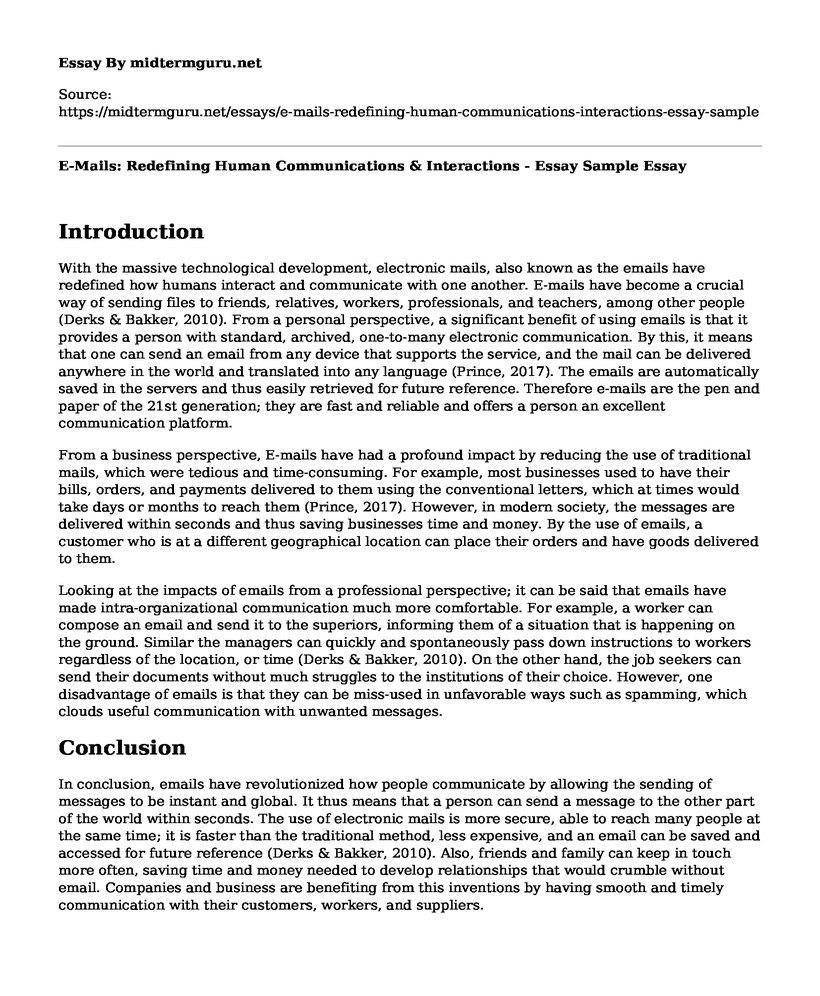Introduction
With the massive technological development, electronic mails, also known as the emails have redefined how humans interact and communicate with one another. E-mails have become a crucial way of sending files to friends, relatives, workers, professionals, and teachers, among other people (Derks & Bakker, 2010). From a personal perspective, a significant benefit of using emails is that it provides a person with standard, archived, one-to-many electronic communication. By this, it means that one can send an email from any device that supports the service, and the mail can be delivered anywhere in the world and translated into any language (Prince, 2017). The emails are automatically saved in the servers and thus easily retrieved for future reference. Therefore e-mails are the pen and paper of the 21st generation; they are fast and reliable and offers a person an excellent communication platform.
From a business perspective, E-mails have had a profound impact by reducing the use of traditional mails, which were tedious and time-consuming. For example, most businesses used to have their bills, orders, and payments delivered to them using the conventional letters, which at times would take days or months to reach them (Prince, 2017). However, in modern society, the messages are delivered within seconds and thus saving businesses time and money. By the use of emails, a customer who is at a different geographical location can place their orders and have goods delivered to them.
Looking at the impacts of emails from a professional perspective; it can be said that emails have made intra-organizational communication much more comfortable. For example, a worker can compose an email and send it to the superiors, informing them of a situation that is happening on the ground. Similar the managers can quickly and spontaneously pass down instructions to workers regardless of the location, or time (Derks & Bakker, 2010). On the other hand, the job seekers can send their documents without much struggles to the institutions of their choice. However, one disadvantage of emails is that they can be miss-used in unfavorable ways such as spamming, which clouds useful communication with unwanted messages.
Conclusion
In conclusion, emails have revolutionized how people communicate by allowing the sending of messages to be instant and global. It thus means that a person can send a message to the other part of the world within seconds. The use of electronic mails is more secure, able to reach many people at the same time; it is faster than the traditional method, less expensive, and an email can be saved and accessed for future reference (Derks & Bakker, 2010). Also, friends and family can keep in touch more often, saving time and money needed to develop relationships that would crumble without email. Companies and business are benefiting from this inventions by having smooth and timely communication with their customers, workers, and suppliers.
References
Derks, D., & Bakker, A. (2010). The Impact of E-mail Communication on Organizational Life. Retrieved from https://cyberpsychology.eu/article/view/4233/3277
Prince, E. (2017). Effective Email. Practical Business Communication, 49-64. doi:10.1057/978-1-137-60606-8_4
Cite this page
E-Mails: Redefining Human Communications & Interactions - Essay Sample. (2023, Jan 17). Retrieved from https://midtermguru.com/essays/e-mails-redefining-human-communications-interactions-essay-sample
If you are the original author of this essay and no longer wish to have it published on the midtermguru.com website, please click below to request its removal:
- Business Administration Case Study Examples: Customer Needs, Strategic Management and Partnerships
- How to Navigate the Relationship - Essay Sample
- Valeant Pharmaceuticals Vs Coca Cola - Research Paper
- Methods of Enhancing the Performance of Contracted Maintenance Organizations - Essay Sample
- Different Types of Divorce - Essay Sample
- L-Choco: Targeting Adults & Children for Online & Offline Marketing - Essay Sample
- HP: Corporate Politics Affecting CEO Changes Since 2005 - Essay Sample







